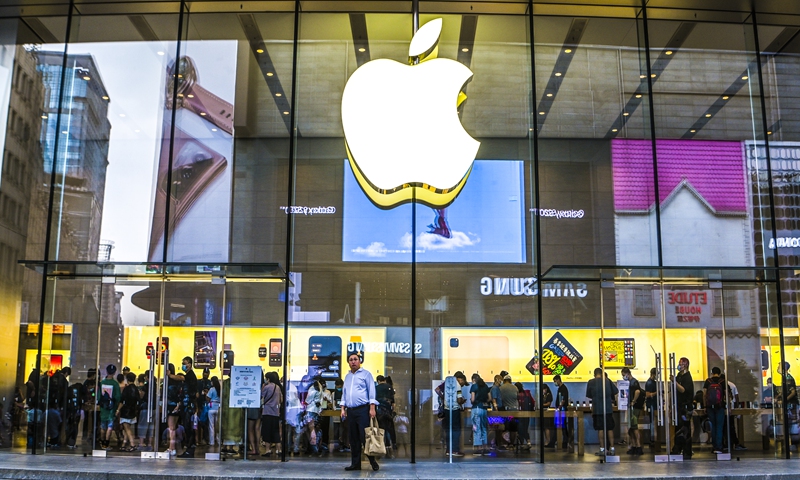
A flagship store of Apple in Shanghai Photo: VCG
Apple has reportedly sought a partnership with Chinese search engine Baidu to provide generative AI solution in its devices sold in China. The US tech company is introducing AI to augment its operating system and other software.
Media reports have suggested that Apple will use Baidu’s Ernie Bot – a generative artificial intelligence product for its iPhone 16, Mac OS and iOS 18 in China.
The Wall Street Journal reported last week that Apple had held preliminary talks with Baidu about using the Chinese company’s generative AI technology in its devices in China, though, “Apple’s discussions with Baidu are still exploratory,” the report said citing people familiar with the matter.
For Baidu, this will be a huge driving force, especially as competition among major large language model (LLM) application manufacturers in China becomes increasingly fierce, analysts said.
Similar to other AI services, Baidu’s Ernie Bot is accessible via an app accessible from the App Store. According to Baidu, after its LLM application announced its opening to the entire society on August 31, 2023, it quickly climbed to the top of the Apple Store’s free app rankings, becoming the first native Chinese AI product to top the app store rankings in China.
According to CNBC, Apple will lay the groundwork for a new AI App Store at Apple’s annual Worldwide Developers Conference in June.
“The company will offer its own AI services, but now it is in discussions with other companies to offer their AI apps for sale, possibly as part of an AI App Store,” an American Apple analyst was quoted as saying by CNBC on Monday.
The progress came amid Apple chief executive Tim Cook’s recent visit to China, when talking about the critical role China plays for the US tech giant. “There’s no supply chain in the world that’s more critical to us than China,” Cook said.
Facing the pressure of AI competition, Apple’s decision to cooperate with Chinese companies to accelerate AI application is a wise decision, Chinese experts said.
The fact that Chinese LLMs are favored by foreign tech companies indicates that the US’ approach to contain China’s technological development will not only restrict US investment in high-tech industry in China, but also expedite China’s tech self-reliance efforts, reducing China’s dependence on external supplies, the experts said.
“The ongoing cooperation between Apple and Baidu reflects the deep integration of the global industry chain,” Wang Peng, an associate research fellow at the Beijing Academy of Social Sciences, told the Global Times on Tuesday.
Also, major companies in the world are increasingly aware that going it alone is difficult to cope with the rapidly changing market, Wang said, adding that only partnership could bring more business opportunities and development space for them.
“Chinese companies like Baidu can also gain more opportunities through cooperation with Apple and others, achieving a win-win situation,” Wang said.
From Apple’s perspective, choosing a compliant and secure AI solution will help Apple better adapt to varied regulatory environment. At the same time, it also shows that Apple values the Chinese market and complies with its regulations, said Pan Helin, a member of the Expert Committee for Information and Communication Economy under the Ministry of Industry and Information Technology.
Wang said that Apple still needs China – the world’s largest smartphone and consumer electronics market – to sustain its growth momentum.
The US government has tried to contain the rise of Chinese high-tech sector in order to maintain its technology dominance in the world, experts said.
China is now actively developing cutting-edge AI technology including large language models, Wang said. “These tech innovations are expected to help China break the sci-tech blockade imposed by the US.”


